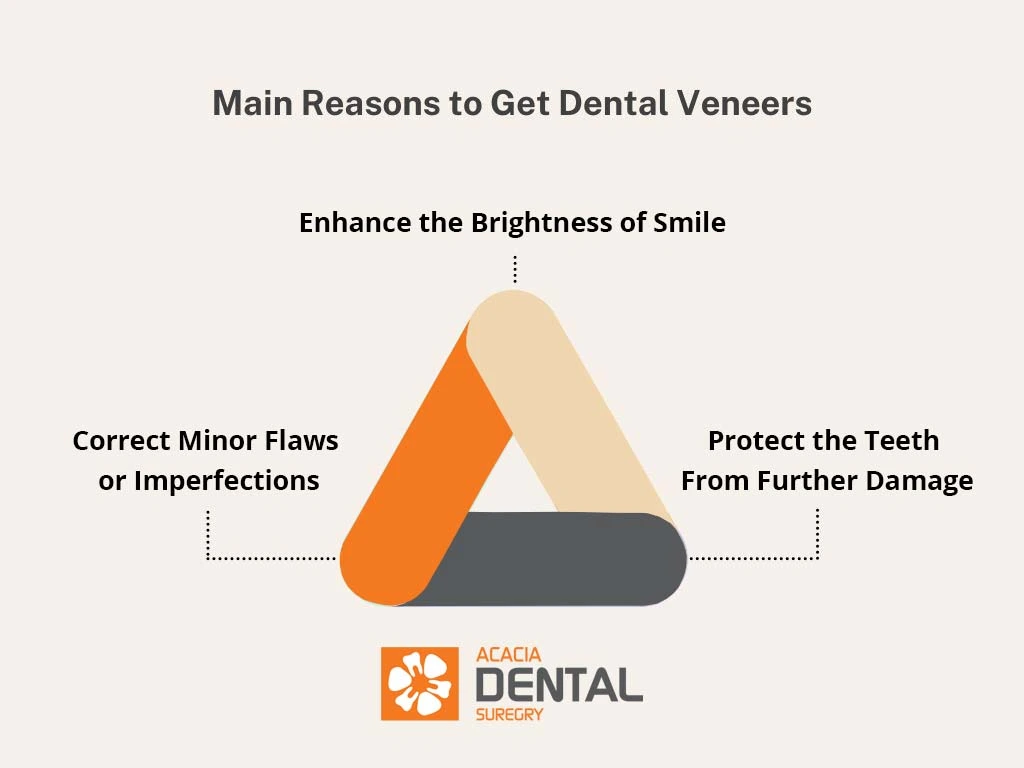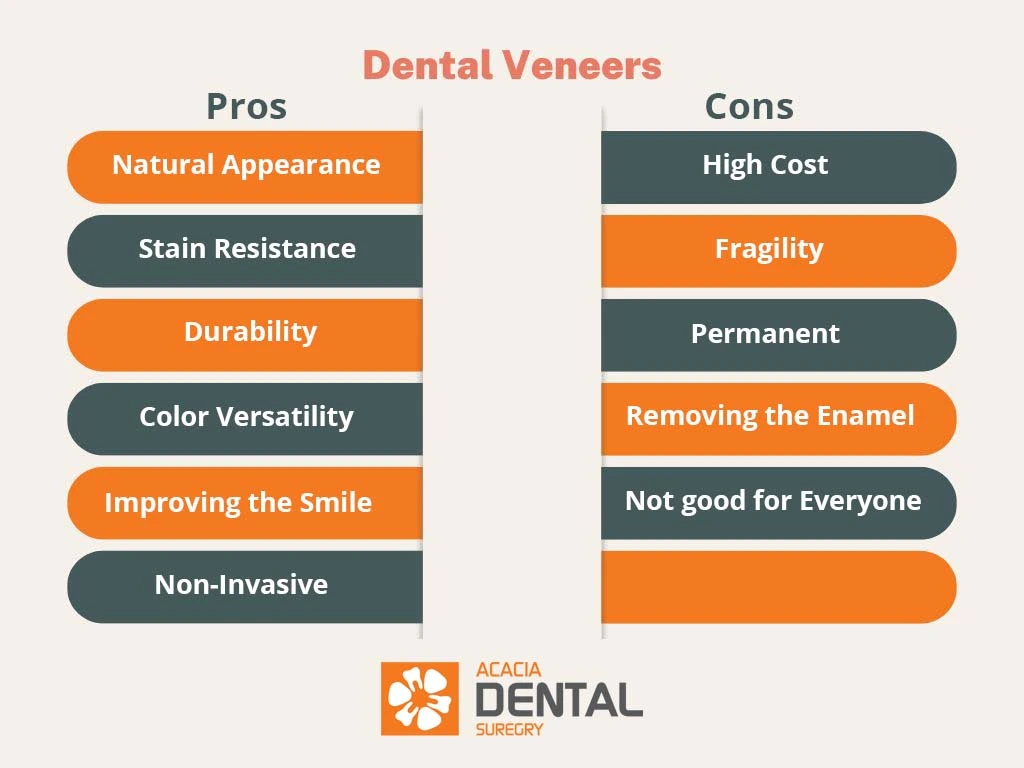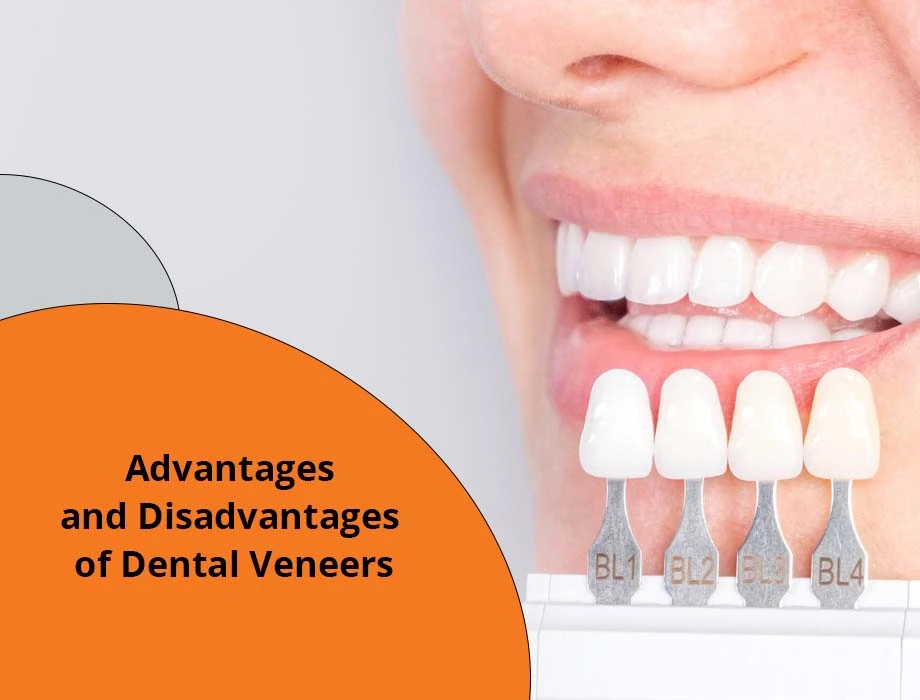Like any other procedure, dental veneers also come with advantages and disadvantages. They might not be the perfect solution for everyone. In this article, we will explain the dental veneers pros and cons.
What Are the Main Reasons that People Get Dental Veneers?
Before getting to know dental veneers’ pros and cons, let’s first explain who needs this procedure.
Dental veneers are thin shells that are usually the same color as a tooth and are attached to the front surface of teeth. The main reason for getting dental veneers is cosmetic issues because veneers cover the surface of the teeth. Therefore, it can make a perfect and bright smile for people. Some of the dental imperfections that veneer can cover are chipped, broken, discolored, or smaller-than-average teeth.
Here are other reasons why people get dental veneers:
- To enhance the brightness of their smile. Dental veneers can cover stains or discoloration that cannot be removed by whitening treatments, such as those caused by medication, smoking, or aging.
- To correct minor flaws or imperfections. Dental veneers can hide cracks, chips, gaps, or misalignments that affect the shape or size of the teeth. They can also create a more symmetrical and balanced smile.
To protect the teeth from further damage. Dental veneers can act as a protective layer for the enamel, which is the outer layer of the teeth. Enamel can wear down or erode due to various factors, such as acidic foods, grinding, or brushing too hard. Dental veneers can prevent tooth sensitivity, decay, or infection.

Generally, if you have mild imperfections and strong teeth, veneers are the right choice. But there are times when this dental treatment is not recommended and the patient should choose another procedure, such as the dental implant or dental crown.
When Dental Veneers Are Not Recommended?
Here are the reasons why you shouldn’t get dental veneers:
- Although no incision is made to the gum during this procedure, unhealthy gum may lead to infection or inflammation. As a result, it will prevent the veneer from adhering to the tooth. It is essential to treat any underlying dental problems, such as tooth decay, gum infection, etc., before getting dental veneers.
- During the veneer procedure, a small layer of tooth enamel is removed so the veneer can sit in its place. If you have thin enamel, your teeth are weak and can’t support the veneer correctly, or you may experience increased sensitivity or pain.
- Veneer can cover teeth imperfections like discoloration or chipped teeth. But it can’t fix bite problems or misalignments. Therefore, if the patient has crooked or crowded teeth, a dental veneer is not recommended. In this case, other dental procedures, such as orthodontic treatment, are required.
- Clenching or grinding your teeth, also known as bruxism, can put a lot of pressure on your teeth and veneers. Therefore, this can cause your veneers to chip, crack, or fall off over time. Furthermore, if the patient wears a night guard, the dental veneer is not recommended.
What Are the Pros and Cons of Dental Veneers?
Like any other dental procedure, dental veneers also have pros and cons that you should consider before getting this procedure.

Dental Veneers Pros
- Natural appearance. No matter what type of dental veneer you choose, the result will be natural.
- Stain resistance. Veneers don’t get stained easily. Porcelain veneers are especially durable against food and drink stains. However, you should still follow your routine dental care. Read more about dental veneer maintenance and aftercare.
- Durability. On average, veneers last up to 10 years. However, depending on the material you choose, it may last longer. For example, composite veneers have a shorter lifespan than porcelain, which usually lasts 15-20 years.
- Color versatility. Veneers don’t come in one color. Depending on the patient’s natural teeth color, the best color will be selected to make the result as natural as possible.
- Improving the patient’s smile. After this procedure, you will see how important your smile is and how it can affect your self-confidence.
- Non-invasive. Since veneer is not a major dental procedure, it doesn’t require any incision. Therefore, it is considered a non-invasive procedure. The patient can go back to their routine life in a few days.
Dental Veneers Cons
- High cost. Maybe the most important dental veneer cons is its price. Since dental veneer is not usually performed only on one tooth, it is considered a costly procedure because the veneer price is calculated per tooth.
- Fragility. Although veneers are highly durable, they are still prone to damage. Therefore, you should be more careful about biting hard food or participating in sports like martial arts.
- Permanent. At the same time that it can be one of the dental veneers pros, being permanent can be a disadvantage, too. When the veneer adheres to your tooth, you can’t undo the procedure because your tooth doesn’t have enough enamel to stay healthy without the veneer.
- Removing the enamel. As mentioned, the small layer of your tooth, called tooth enamel, is removed during the veneer procedure. This will make your tooth more sensitive to hot or cold food.
- Not good for everyone. Veneer is not the perfect solution for everyone.
Bottom Line
The dental veneer is one of the most popular cosmetic dentistry, which not only can affect the person’s smile but it can enhance self-confidence. Furthermore, it is non-invasive, so there are no concerns about the complications of the procedure. But like any other procedure, dental veneers are not for everyone or always the perfect solution. In this article, we explained the pros and cons of dental veneers so that you can understand what you get from this procedure and what you may lose.
Ultimately, getting dental veneers or any other dental procedures is not something that is up to patients. It is always recommended to consult with a specialist to choose the perfect solution based on your condition, budget, and other preferences.
